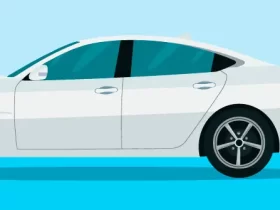Picture this:
You’re driving around town. Maybe you’re running errands for the first time in a while. Or maybe the problems have been creeping up on you gradually and now it’s a case of all the little things adding up to a big problem.
It started with a funny noise here and there. But next thing you know, your car has a reputation with friends and family for being unreliable.
But here’s the thing:
In most cases, a bad car battery isn’t going to become a dead car battery overnight. There are typically red flags waving before the day your car finally refuses to start. We’ve put together a list of seven signs of a bad car battery. Take a look and see if anything here sounds a little too familiar.
1. Your Headlights Are Dimmer Than They Used to Be
This one can be hard to notice if you drive your car every day. And admittedly, standards of brightness can vary from car to car. But, if you’re heading home after visiting a friend late and you notice yourself straining to see the road in front of you, it’s possible that your headlights are dimming and your battery is the reason why.
Generally speaking, when your battery isn’t in top form, it may struggle to deliver power to your vehicle. You might have to take a few drives to confirm it, but if your lights just aren’t as bright as they should be, you could have a dying battery on your hands.
2. It’s Hard to Get Your Car to Start After It’s Been Sitting Overnight
We all try our best not to do it, but leaving the lights on or forgetting to turn the interior light off is an experience that every driver has lived through at least once. Of course, if your car lacks a little sharpness in the morning when the lights have been on all night, that’s to be expected. After all, if you’ve pulled an all-nighter while writing papers or preparing a presentation for work before, then you already know that working late without taking a break can take a serious toll on your immune system.
However, there’s being a bit less sharp, and then there’s being catastrophically ill. If your car’s response to having a light on for extended periods is to die, then you may have a battery problem.
3. You’re Struggling to Start Your Car
Time for a quick physics lesson.
Turning the key to start your engine often feels like something that should just happen. But the truth is that the ignition switch is actually essential to making a car start. Why? Because the key lets the battery know that it needs to send an electrical current to your starter solenoid. This current lets your engine know that it’s time to get going.
However, there’s a catch:
The solenoid needs a sufficient amount of electricity to be sent for the engine to come to life. If you turn your key and it’s a toss-up as to whether your car is going to start or it’s going to huff and puff like a cat throwing up a hairball, you could be witnessing the death of your battery.
4. The Check Engine Light Is Always On
In some regards, the check engine light is like being out of breath or having random bouts of fatigue. The situation could be caused by anything, but everybody knows that the underlying causes are probably not good.
But what happens when you’ve checked for overheating, the oil pressure is fine, and your car is otherwise driving but the light won’t turn off? Your battery could very well be the culprit.
And if you’ve reached a point where the flashing “check engine” light is as much a regular part of your drive as your car freshener and your dashboard bobblehead, you have every reason to suspect that your battery just isn’t doing what it needs to do.
5. You’re Having Problems With Your Electronics
Some vehicles are bonafide luxury boxes on wheels. Today, you can buy a car that has heated seats, satellite radio, Bluetooth connection, cellphone chargers, and more.
What do all of these convenient features have in common?
They’re all powered by your car battery.
If you’re noticing that your heated seats are hit and miss or that your in-vehicle cellphone charger is just not driving as much current as it should, that could be an early sign that your battery is reaching the end of its lifespan.
6. You’d Be Lost Without Your Gas Pedal
This one can be hard to miss because it’s often not quite as in your face as a clicking engine or an inconsistent radio signal. But it’s nonetheless another indicator that your battery is just not generating as much power as it should be.
When you turn your key, you shouldn’t have to press the gas pedal to ensure that your car is brought to life. And as tempting as it might be to consider this a simple quirk of your vehicle, it could be a sign that there’s something wrong with the battery.
7. Your Car Has Started to Backfire
In a perfect world, your car would start smoothly and you wouldn’t have anything to worry about. But, as cartoonish as this may sound, if you notice that your car is backfiring, you may have yet another sign on your hands that your battery needs to be replaced.
Here’s why:
Because a car battery that’s in the middle of its death throes often won’t provide a consistent charge. If the on-again-off-again sparking results in your car letting fuel sit in the cylinders, it’s not unusual for your car to start backfiring as a result.
Here’s What Should You Do If You Suspect Your Battery Is Failing
So let’s just assume that you’ve read through this list, checked off every item, and now you’re pretty sure that you’ve got a bad car battery. Is there anything that you can do? We’ve put together a few tips and things to keep in mind that could come in handy.
1. Try Jump-Starting Your Car
Yes. That’s right. It’s possible to reverse your car battery fortunes with a few jumper cables and another car. If you ask your relatives and friends for a boost and then you spend around half an hour or so driving, you may be able to breathe some new life into your vehicle.
However, it’s important to keep in mind that this is a temporary solution in many cases. As such, your car may not be able to hold the charge for long.
2. Look For Other Sources of Battery Drain
Sometimes bad car batteries are a symptom of a much deeper disease. Perhaps you’ve got an issue where your heated seats are taking up a disproportionate amount of electrical charge. Or perhaps there’s an engine problem that’s sapping away at your battery unbeknownst to you.
This part can be difficult to do. So if you suspect that you have car battery problems that aren’t actually being caused entirely by your car battery, you may want to consult with a professional.
3. Think About the Age of Your Battery
Like plants or pets, car batteries have a life expectancy. If you’ve had the same battery for five years or more, it may be time to consider getting a replacement. Of course, changing a car battery isn’t always easy. And because these batteries are essential to your car, you also don’t want to run the risk of making a mistake during the process of changing out your battery.
If you’re not sure how to change a car battery and the tutorials you’re watching aren’t making all that much more sense, there’s no shame in asking a professional technician or mechanic to do it for you. Think of the new car battery as the price of maintaining your car.
Identifying a Bad Car Battery Can Save You a Lot of Time and Trouble
In 2018, 83 percent of American adults described themselves as “frequent drivers” alongside an additional 6 percent who drove on a semi-regular basis. When you’re on the road that often because you’re heading to work or school, car problems can be enough to strike real fear into a person’s heart. When you’re able to spot and recognize the signs of a bad car battery, however, getting your vehicle back on the road becomes a lot easier.
To find out more information on car maintenance, check out the rest of our site.









